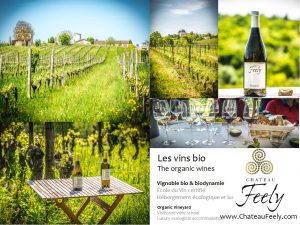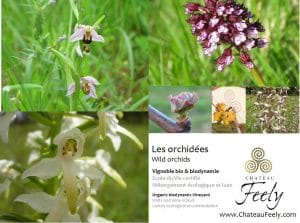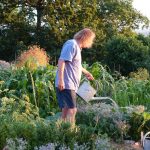Why choose organic food? Why choose organic wine? In this post three key reasons in detail to kick off our series on why organic (See my top ten reasons to celebrate supporting organic).
1. For your health:
If it is farmed with pesticides then it will have pesticide residues. Logical.
There are three direct (and seriously bad) effects of systemic pesticides on human health;
- They are carcinogens – they give you cancer (see cancer rate in school surrounded by conventional vineyards 5 times national average and Farmer dead after pesticides in face)
- They are nervous system disrupters – they generate diseases like alzheimers, parkinsons, motor-neuron disease, autism (see article on nervous system disruption court case won by a vineyard worker)
- They are endocrine disrupters – they mess with hormones and reproductive capability increasing fertility problems and increasing the risk of cancer related to reproductive parts eg prostate and breast cancer
The only way to be sure you are not consuming systemic pesticides (which cannot be washed or peeled off) is to buy certified organic or grow your own.
Systemic pesticides are highly toxic – many state that you should not enter the field for 48 hours after using them. They can kill the farmer if he gets the jet in his face. Yet they are routinely sprayed alongside schools, houses, water sources.
The only logical response is to demand organic.
Demand organic for everything but especially your wine.
Facts to reflect on:
- The levels of pesticides in chemically farmed wines are on average hundreds of times the level that is considered acceptable in our drinking water (study by Que Choisir consumer watchdog magazine in France)
- According to ANSES (Agence nationale de sécurité sanitaire de l’alimentation, de l’environnement et du travail) in France vineyards consume 20% of the pesticides sold but they only represent 3% of the farmed land
- ‘Que choisir’ also did a study of muesli and found pesticides in all non-organic brands including those that communicate about loving the bees and being nature friendly (the only answer is to buy organic).
The naturally farmed product will also have more positive health giving food value, higher levels of vitamins and minerals, higher levels of anti-oxidants like resveratrol in the case of wine.

Why choose organic wine three reasons in depth
2. For the taste:
Taste is very personal but there is proof that taste is better with organic wine and even more so with biodynamic wine.
The only EU funded long term project comparing conventional, organic and biodynamic viticulture is at Geisenheim university in Germany. They have compared 2 hectares of conventional, 2 hectares of organic and 2 hectares of biodynamic riesling vines since 2005/6. In their blind taste tests over the ten years biodynamic came first, organic second and the conventional chemically farmed wine came last. Wines farmed naturally have higher natural acidity and this brings a vibrancy, length and an element of ‘relief’ – almost like a hilly landscape compared to a flat one.
facts to reflect on:
- Recently at the ‘Concours Général Agricole’ the General Agricultural Competition nearly 50% of organic wines won medals while only 23% of all wines won medals.
- Similarly at a recent Decanter World Wine Awards 65% of the organic wines won awards while the level of medals in general was only 33%.
- The most expensive (and hence clearly considered (one of) the best in terms of taste) wine in the world is organic and biodynamic – Domaine Romanee Conti – as are many other top wineries. They know that natural farming is the only way to truly great taste. It cannot be faked.
- See our article on the taste of pesticide in conventional wine – research by Seralini

Biodiversity bats frogs birds plants bees at Chateau Feely
3. For the environment (this affects all of us not just the frogs and the bees).
We can see from point one that it is not just about you the drinker but also about the farmer, the farm worker, the schools nearby, the people living nearby. What happens to those chemicals? They land up in our water sources and in the air we breathe not just in the product you consume many miles away. Your choice of farming method for the food you eat affects:
- water quality
- biodiversity
- long term sustainability
facts to reflect on:
- Between 1998 and 2008 France abandoned close to 400 water capture zones per year (destined for human consumption), largely due to unacceptable levels of agricultural chemicals
- 92% of Frances water courses are polluted by pesticides
I have a winegrower friend who couldn’t find a market for his delicious organic wine and had declassify it to go into a bulk conventional blend to be mixed with other wines packed with pesticides. He is even considering giving up organic because he cant afford to carry on if he does not get the small premium (usually around 20% on the bulk market) for farming organic. We need to support organic wine and spread the word about why organic is so important so the 10% of vineyards in France that are organic don’t stop and that those considering organic can see a secure financial future in it.
Buying organic shows that you value your health, that you respect the people growing your food and those living where your food is grown. Take pleasure in the wonder of great food and drink.
Here’s to good health! To Joy! To organic wine!
See our series on why organic starting with these basics in more detail. Come and learn more about organic farming with a visit to Chateau Feely in South West France ; stay with us or do a multi day course or multi day tour .
You can read about the story of our organic farm the series includes four books Grape Expectations: A Family’s Vineyard Adventure in France (Caro Feely Book 1). The series offers a true picture of what it is like running a vineyard and wine business and life on a vineyard. Saving Our Skins: Building a Vineyard Dream in France (Caro Feely book 2 )
the third Vineyard Confessions (Caro Feely Book 3)
and the fourth Cultivating Change.
Join our mailing list to receive our seasonal newsletter, events, wine pairing, recipes and more info on this topic at the bottom right of this page.

Wild orchids at Chateau Feely









